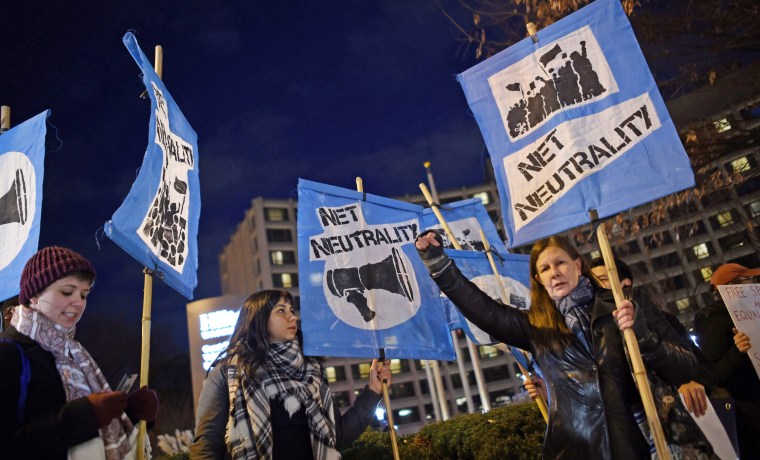Net neutrality is officially no longer the rule of the land.
The internet traffic rules put in place under former President Barack Obama and celebrated by open internet advocates have been undone, with Monday marking the first day of the new regulatory system voted on by the Federal Communications Commission in December.
The now-defunct rules required companies that provided internet service to consumers to abide by a series of rules that prevented them from blocking lawful websites, manipulating internet speeds or striking deals with companies like Google and Facebook for so-called “internet fast lanes.”
The news rules now leave the policing of how internet service providers handle web traffic to the Federal Trade Commission, which is tasked with making sure internet providers don’t engage in “anti-competitive” behavior.
The setback is doing little to quell the enthusiasm of net neutrality advocates, who have been rallying around efforts to implement similar rules at the state level. There’s also a resolution by Democrats in Congress — with some Republican support — to undo the FCC’s decision and re-implement the Obama-era rules that has passed the Senate but faces long odds in the House of Representatives.
“Congress can still overrule the FCC and restore net neutrality,” said Evan Greer, deputy director of Fight For the Future, which has advocated for strong net neutrality rules. “We're going to make them.”
Over the past six months, tech companies, small businesses, consumers and lawmakers have tried to prevent Monday’s repeal from happening, but to no avail.
At least 22 states have filed suit with the FCC over the repeal and many have passed their own net neutrality laws. Those laws will be challenged by the FCC, which claims its rules preempt those at the state level.
Many large internet service providers, including Verizon, AT&T and Comcast, the parent company of NBCUniversal, have pledged to not block or discriminate against traffic.
Ajit Pai, the FCC chairman, led the repeal of the net neutrality rules and continued to argue that the new system will be better for consumers and provide companies with incentive to invest in more broadband internet access.
“Our framework will protect consumers and promote better, faster internet access and more competition,” Paid wrote in an op-ed published on CNET on Sunday.
Net neutrality advocates have heard that argument before and don’t buy it. They counter that internet providers will slowly and quietly begin manipulating the internet with moves that will change the web from a level playing field to one tilted in favor of big companies.
“The internet’s death will be slow,” Greer said. “You probably won’t even notice it happening at first. That’s what makes it so sinister.”
Jessica Rosenworcel, a Democratic FCC commissioner who has been an outspoken net neutrality advocate, said in a statement on Monday that the battle over how the internet is regulated is far from over.
“The momentum around the country — from small towns to big cities, from state houses to court houses, from governors’ executive actions to action in Congress — is proof the American people are not done fighting for an open internet,” Rosenworcel said.
